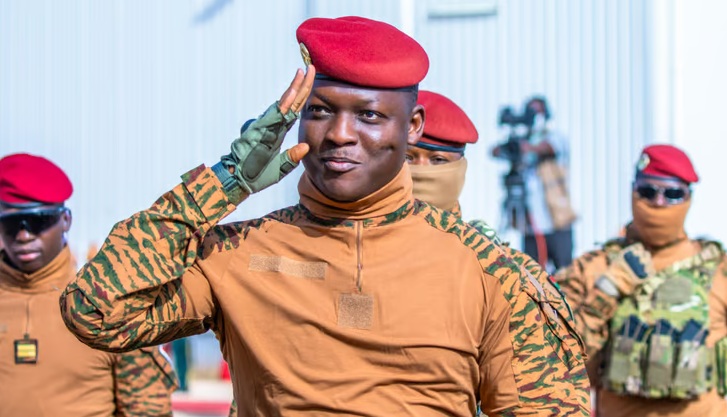As insurgency intensifies and civic space shrinks in the West African state, a different kind of battle is unfolding online where AI-generated images, deepfake anthems and algorithmic fervour have turned the young military leader into a digital messiah.
The face of Captain Ibrahim Traoré has been beaming across social media feeds throughout West Africa and from posters and placards hoisted in the streets of Burkina Faso‘s capital Ouagadougou, London and beyond. His image appears in various forms. Sometimes he seems stoic in military fatigues, other times draped in pan-African flags or depicted as a divine warrior glowing with celestial light.
In dozens of viral TikTok edits, Traoré leads imaginary armies, topples Western empires and is hailed as the “new [Thomas] Sankara”. The captions, bold and uncompromising, include “Africa’s Messiah!” “The People’s Captain!” and “France Must Fall!”
The images – curated, multiplied and mythologised – are now central to a rapidly evolving online movement that fuses anti-imperialism, youth frustration and pan-African aspiration.
The main concern? Many of the images used and shared across social media and the internet aren’t real. They are machine-generated hallucinations, the product of AI tools; manipulated audio and filters that feed an online ecosystem of adoration.
The pro-Traoré social media buzz took off following a protest in Ouagadougou on 30 April when tens of thousands rallied in a massive show of support for the 36-year-old military ruler. Smaller solidarity protests emerged in Accra, London and Montego Bay, Jamaica. In Nigeria, two demonstrators were charged with inciting public disturbance and conducting an unauthorised assembly for organising a procession in honour of Traoré.
But online, AI-generated images depicted fictional demonstrations in Nairobi, Harare, Kampala and even New York’s Times Square. Deepfake audio tracks mimicking the voices of global pop stars like Rihanna and Beyoncé singing praises of Traoré circulated widely, blurring the line between digital propaganda and fan-driven mythmaking.
From social media feed to frontline
Traoré seized power in September 2022 amid escalating jihadist violence and mounting public anger at French influence in Burkina Faso. He has since styled himself as a revolutionary anti-imperialist, cutting ties with France, aligning more closely with Russia and vowing to restore sovereignty in a country plagued by insurgency.
Traoré successfully cultivated an anti-colonial stance that speaks directly to a generation disillusioned by neoliberal promises and post-independence elites.
Political risk analyst Jessica Moody sees Traoré’s rise as part of a broader reckoning with decades of foreign exploitation. “This political moment is fuelled by a feeling that Africa has been taken advantage of by foreign powers for too long,” she says. “There is an upsurge in resource nationalism and a desire to ‘make Africa great again’, to regain sovereignty and develop the continent from within.”
According to Moody, France remains the primary symbol of neo-colonial frustration. “This is based on decades of companies and countries, especially France, profiting from African economies with little regard for sentiment on the ground. That frustration has been epitomised by [Emmanuel] Macron’s presidency, in which he has fundamentally failed to understand how the French are perceived in West Africa.”
More rhetoric, less reform
Much of Traoré’s appeal rests on rhetoric and not institutional reform. But that has not slowed his meteoric rise on social platforms.
“There has been a sustained sense of support for Traoré,” says security analyst Beverley Ochieng. “As a young leader and a powerful orator, he resonates with many who are increasingly questioning the relationship between African countries – especially in the Sahel – and the West. He speaks directly to a generation navigating the legacies of imperialism, post-colonialism and neo-colonialism.”
In the digital age, Ochieng says, that support feels even more amplified. “Thanks to social media, it appears global and widespread. You see it in the rhetoric of Tanzanian opposition leaders, among Kenyan officials, South African youth groups and even in personal encounters.”
“It’s algorithmic populism; emotional, visual, anti-Western and hyper-shareable,” says Burkinabe researcher Alidou Werem. “It’s about vibe and vision and not fact or policy. Social media platforms reward spectacle and Traoré’s image fits perfectly into that ecosystem.”
Digital repression by proxy
Pro-Traoré internet and social media warriors seem to stop at nothing to build and defend the image of a man who, in reality, leads a fragile transitional government in one of the world’s most unstable regions.
The glorification comes with a cost, one increasingly paid by Burkinabe journalists, activists and ordinary citizens who raise critical questions about Traoré’s rule. “We are witnessing the rise of a digitally sanctified ruler where criticism becomes sacrilege,” says Werem.
Despite his populist appeal, tangible reforms under Traoré’s leadership remain limited. While he has implemented measures such as reducing ministerial salaries and increasing civil servant wages, the broader challenges of security and governance persist. The ongoing jihadist insurgency has displaced over two million people, and much of the country remains outside state control.
Journalists in Burkina Faso are increasingly subjected to online abuse for being critical of Traoré and his junta. This, according to rights groups, reflects a broader pattern of intimidation and censorship under the country’s military-led government.
However, this isn’t merely social media toxicity. Analysts and activists warn it’s a new form of digitally outsourced repression, where the state may not have to censor because online mobs do it for them.
“Traoré’s popularity has crowded out dissenting voices,” says Ochieng. “His rhetoric still falls short of real, measurable improvements in security and civic freedoms. There is a gap between his message and the reality on the ground, something that will ultimately test his legitimacy and legacy.”

